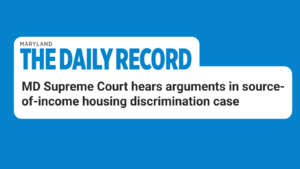Attorney Lauren DiMartino argued a fair housing case before the Supreme Court of Maryland in Annapolis on May 5, challenging landlords’ use of minimum-income screening policies to discriminate against voucher holders, as reported on by The Daily Record. The case is Katrina Hare v. David S. Brown Enterprises, Ltd.
Landlord David S. Brown Enterprises denied Katrina Hare’s application for an apartment because she did not satisfy a policy requiring applicants to demonstrate an income of at least 2.5 times the full monthly market rent, even though Ms. Hare would only be responsible for a small portion of the rent and the county housing authority would have been responsible for paying the larger portion covered by her voucher. This policy would exclude the overwhelming majority of voucher holders in the State.
“Voucher holders — and only voucher holders — are required to show an income that is untethered from their financial obligation,” Lauren argued.
Lauren argued that any income test that does not account for the reality that voucher holders are not responsible for the government’s housing assistance payments wrongfully excludes voucher holders from housing they are otherwise qualified to rent.
At the Supreme Court, Lauren quoted the co-sponsor of the HOME Act, Delegate Stewart, and described the landlord’s policy as an “insidious workaround.”
Although the HOME Act requires landlords to accept housing vouchers, landlords are using minimum income criteria divorced from voucher holders’ share of the rent in a way that disproportionately harms tenants with rental subsidies. These policies create a loophole that defeats the remedial intent of the HOME Act, which bans housing discrimination based on source of income in order to decrease segregation and provide more opportunities for economic mobility.
The Attorney General of Maryland filed an amicus brief in support of Ms. Hare. Another amicus brief was filed by the Public Justice Center, Lawyers Committee for Civil Rights Under Law, National Housing Law Project, Equal Rights Center, National Fair Housing Alliance, Homeless Persons Representation Project, Fair Housing Justice Center, and Disability Rights Maryland.
“Minimum income policies like David S. Brown’s close the doors that the Home Act intended to open, and eviscerate the remedial purpose of the statute,” Lauren told the court. “The plain language of the act requires that any income verification policy be commercially reasonable and nondiscriminatory. DSB’s policy is neither.”
The Petitioner’s Brief filed in this case, written by Lauren along with Andy Freeman and with support from paralegal Katherine Garvey, can be found here.
Learn more about BGL’s Appellate and Fair Housing practices.
LEARN MORE ABOUT LAUREN DIMARTINO
Lauren’s client-centered practice is focused on ensuring diverse communities can thrive, whether it’s through challenging various types of discrimination including in housing, holding government actors accountable, or advocating for local businesses embroiled in dispute. She has a robust practice involving the Fair Housing Act, utilizing it to assist individuals and non-profits impacted by discriminatory conduct and to challenge systems perpetuating segregation, with a particular interest in the intersection of housing and public education. Learn more about Lauren here.
LEARN MORE ABOUT ANDY FREEMAN
Andy Freeman obtains results for his clients. A partner at Brown, Goldstein & Levy, he has won numerous verdicts, judgments and settlements of millions, tens of millions and in one case, over one billion dollars by mastering the relevant law and getting to know his clients, their problems and the evidence in their cases. Andy is an expert at difficult cases that require complicated combinations of law and facts or that require making a new law altogether. Learn more about Andy.
Founded in 1982, Brown, Goldstein & Levy is a law firm based in Baltimore, Maryland, with an office in Washington, D.C. The firm is nationally recognized in a wide variety of practice areas, including complex civil and commercial litigation, civil rights, health care, family law, and criminal defense. Above all else, Brown, Goldstein & Levy is a client-centered law firm that brings decades of experience and passionate, effective advocacy to your fight for justice.
